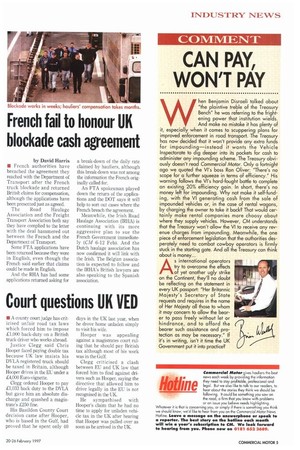CAN PAY, WON'T PAY
Page 7

If you've noticed an error in this article please click here to report it so we can fix it.
When Benjamin Disraeli talked about "the plaintive treble of the Treasury Bench" he was referring to the frightening power that institution wields. And make no mistake it has plenty of it, especially when it comes to scuppering plans for improved enforcement in road transport. The Treasury has now decided that it won't provide any extra funds for impounding—instead it wants the Vehicle Inspectorate to dig deeper into its pockets for cash to administer any impounding scheme. The Treasury obviously doesn't read Commercial Motor. Only a fortnight ago we quoted the VI's boss Ron Oliver: "There's no scope for a further squeeze in terms of efficiency." His warning follows the VI's hard-fought battle to complete an existing 20% efficiency gain. in short, there's no money left for impounding. Why not make it self-funding, with the VI generating cash from the sale of impounded vehicles or, in the case of rental wagons, by charging the owner to take it back? That would certainly make rental companies more choosy about where they supply vehicles. However, CM understands that the Treasury won't allow the VI to receive any revenue charges from impounding. Meanwhile, the one piece of enforcement legislation that the authorities desperately need to combat cowboy operators is firmly stuck in the starting gate. And all the Treasury can think about is money...
s international operators try to overcome the effects of yet another ugly strike on the Continent, they'll no doubt be reflecting on the statement in every UK passport: "Her Britannic Majesty's Secretary of State requests and requires in the name of Her Majesty all those to whom it may concern to allow the bearer to pass freely without let or hindrance, and to afford the bearer such assistance and protection as may be necessary." If it's in writing, isn't it time the UK Government put it into practice?


























































































































